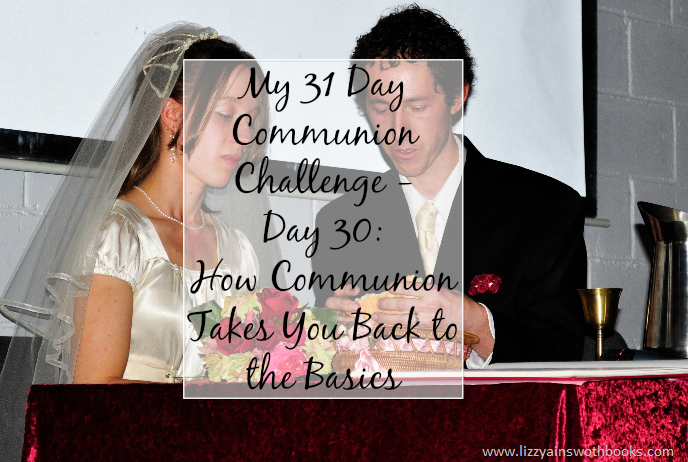
When you become a Christian or even if you have grown up in a Christian home, there is so much to learn, so many books you can read, so many tapes to listen to, and most of it’s pretty good. I am prolific reader, and on long car trips we used to listen to a lot of tapes before the Wiggles and Play School dominated the sound system.
However there was still so much about the covenant that we are in with God that I just didn’t get, and didn’t understand the importance of. How the Old Testament relates to the New. How the covenant was completed by Jesus. How to discern the Word based on the cross.
Studying communion has taken me back to the very basics of our faith. In fact sharing communion regularly should be one of our very basics, it was a foundational truth to the new church. Some Christians have said to me whilst I’ve written this study that living their lives for Christ is their ‘communion’ with Christ and they don’t need to take communion. Sorry, that’s not Biblical. We were commanded to share bread and wine/juice as often as we think of it, whichin Middle Eastern culture is everyday.
There is so much symbolism in the Bible between what was going on in the Old Testament with Moses that gives us a glimpse of what happens at the cross, like that whole incident of speaking to the rock instead of hitting it. Why was that such a bigdeal?
And the Manna God provided the Israelites came down from heaven everyday, to strengthen and sustain them, and Jesus compared Himself to this very Manna. Is there a key here in sharing his body?
When the blood was honoured in the Old Testament, the anointing of the Holy Spirit followed swiftly and so did the Glory. As Jesus blood is honoured today, it becomes a breeding ground for miracles and healings, one of the very gifts He died so that we should receive. Stephen’s aunty shared once that as a young man at a church camp shared about a vision of Jesus and His blood on the cross that He saw, the Holy Spirit came and swept into the room and changed her life.
There are so many basics of our faith that we miss by failing to share communion regularly.
- Understanding the difference between atonement (covering) of sin and the complete washing away of it, and becoming righteous conscious, focused on the righteousness we have in Christ and being empowered to forsake the old nature.
- Sharing together at the table, a holy meal. Even if amidst the craziness of life your family doesn’t share a meal together, calling everyone together for 5 minutes or breaking bread with guests brings a whole new meaning to family. We discussed how to do that here. Sometimes the best way to be enriched in our faith is to have everyone focused on Jesus and discussing it around the table.
- Walking in divine health, because as we’ve confessed our sins, the power of the blood and bread going into our bodies brings healing and prolongs our lives, as taking the Passover Lamb, which was a foreshadow, enabled all of the Israelites to walk out with none feeble among them.
- As we are sitting still just taking communion ourselves, it’s a pause, the very word ‘Eucharist’ is a thank you, a refocusing on Jesus and away from our day. The very blessings used in many Eucharist services in churches is based on the Hebrew blessings, which we studied.
